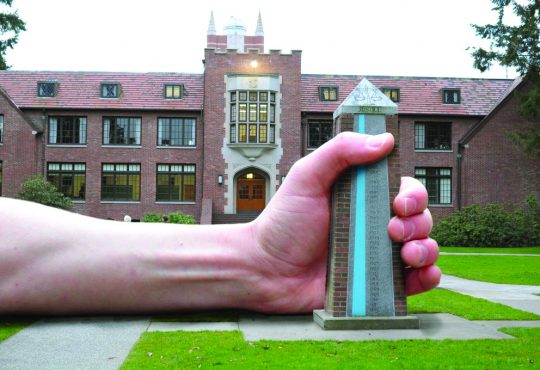For many college students both at Puget Sound and across the nation, an idealized romantic partner is very likely to be the same age as the student in question.
There are many reasons for this; such a partner will be more likely to be going through similar struggles, will better understand the student’s cultural references and will be more inclined to spend time in similar social circles, among many other reasons.
The prospect of a romantic relationship with a non-student therefore becomes unappealing, and this is compounded if there is a serious age gap.
This is to be expected as few students would opt to date someone with whom they share no friends, someone who has little sympathy toward academic struggles or someone who is inclined to want a completely different romantic experience from them.
Yet as time passes, the visibility of intergenerational couples has increased dramatically, from 36-year-old White Collar star Matt Bomer’s marriage to 49-year-old Simon Hall to 20-year-old English diver Tom Daley and 40-year-old American screenwriter Dustin Lance Black.
But why do we hold a stigma against such romantic relationships?
Marriage equality blogger Keith Pullman cites jealousy, envy, ageism, sexism and sex-negativity as the primary culprits for society’s view on intergenerational love.
“There is this idea that a relationship has to be monogamous, lead to marriage and baby-making and last until death, and intergenerational relationships are not seen by people asserting this notion as ideal for that, even though it is possible for such relationships to be monogamous, lead to marriage and baby-making and last until death,” Pullman wrote.
Critics of such romance often view these relationships as perverse and unhealthy, allowing one partner to take advantage of the other. Perhaps an older man may be seen as being in denial about his age if he dates a younger woman, or the younger woman may be seen as desperate for a father figure. Perhaps both partners appear to be avoiding real commitments, or are merely using one another for sexual pleasure.
Yet these same complaints can, for the most part, be applied to relationships between people of the similar ages just as well. If a man who feels he is unattractive begins a relationship with a woman considered to be beautiful, might he not be using her for validation or evidence of his own attractiveness?
If two people are in a relationship primarily comprised of sex, why would their ages matter as long as the sex is consensual and legal?
Criticisms of intergenerational relationships therefore often come down to two issues: power dynamics and difference in life experience.
Those that view such relationships as being intrinsically wrong often take the stance that with two people who are in significantly different stages of life, one will always have an enormous form of power over the other. This may be a younger woman with sexual sway over her older partner, or an older man with fiscal power over his younger partner.
Those that view such relationships as intrinsically problematic usually take the stance that, outside of a certain age range, romantic connection with a person of a different age is too difficult because what they value—what makes them laugh, cry and think—will be so different.
There are, of course, intergenerational relationships that suffer such problems, and there are those who would wish to take advantage of others by means of such relationships.
But between two mature adults, an intergenerational romance can be healthy and balanced. Similarly, if one does not define oneself by means of generation-specific cultural references and identity, then two such people can find that they have a great deal in common.
This is not necessarily to advocate for intergenerational romance, but rather to open the door to its consideration.
In his article “The Value of Intergenerational Relationships,” Experience Lifetime writer Joseph Hart describes the many positive aspects of building any form of connection between generations, pointing to the connection to broader culture younger generations provide and the enduring sense of what is important that older generations provide.
“The most important thing in cultivating an intergenerational friendship is to hold that friendship to the same standards as any other,” Hart wrote. “With common interests at their core, intergenerational friendships can blossom into rich, profoundly satisfying connections.”
Although in this article Hart discusses the value of intergenerational friendships and how to approach them, all of these lessons can be carried over to intergenerational romance as well.
Although the typical Puget Sound student dreams of a partner with whom they can joke, cry and share experiences with, widening the age range of one’s consideration can open the world to new relationships you might never have benefitted from.






